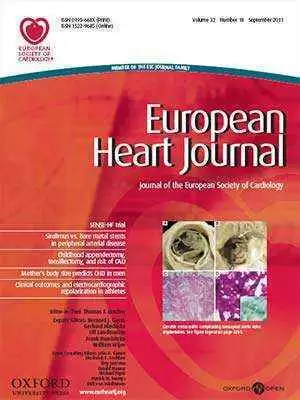Celiac.com 10/05/2011 - Researchers have established a number of inflammatory markers as risk factors for atrial fibrillation (AF), but they know very little about how autoimmune diseases affect AF.
A team of researchers recently set out to examine the association between celiac disease and AF in a large cohort of patients with biopsy-verified celiac disease.
Celiac.com Sponsor (A12):
 The research team included Louise Emilsson, J. Gustav Smith, Joe West, Olle Melander, and Jonas F. Ludvigsson.
The research team included Louise Emilsson, J. Gustav Smith, Joe West, Olle Melander, and Jonas F. Ludvigsson.
They are affiliated variously with Arvika Hospital in Arvika, Sweden, the Department of Cardiology at Lund University in Lund, Sweden, the Broad Institute of Harvard and MIT in Cambridge, MA, USA, the Department of Clinical Sciences at Lund University in Malmö, Sweden, the Division of Epidemiology and Public Health at University of Nottingham, Nottingham City Hospital, the Nottingham Digestive Diseases Centre, NIHR Biomedical Research Unit in Nottingham, UK, the Department of Pediatrics, Örebro University Hospital in Örebro, Sweden, the Clinical Epidemiology Unit, Department of Medicine at Karolinska University Hospital and Karolinska Institutet in Stockholm, Sweden.
For their study, the team used reports from biopsies performed between 1969 and 2008 at all 28 pathology departments in Sweden. They used reports of March 3 villous atrophy to identify 28,637 patients with celiac disease.
The team then used the Swedish Total Population Register to compile a group of 141,731 individuals, who were matched for age and sex.
The team gathered data on AF via the Swedish Hospital Discharge Register, the Hospital Outpatient Register, and the Cause of Death Register. They used Cox regression to estimated hazard ratios (HRs) for AF.
Over an average follow-up period of nine-years, 941 individuals form the group with celiac disease developed AF, compared with 2918 from the control group.
The adjusted HR for AF was 1.34 (95% CI = 1.24–1.44). The absolute risk of AF for the group with celiac disease was 321 for each 100,000 person-years, with an excess risk of 81 of 100,000.
People with a prior AF diagnosis also faced a higher risk of subsequent celiac disease (odds ratio = 1.45, 95% CI = 1.31–1.62).
The data show that atrial fibrillation is slightly more common both before and after celiac disease diagnosis in patients with celiac disease.
Potential explanations for higher AF risk in people with celiac disease include chronic inflammation and shared risk factors, but sampling bias may also play a part.
These results indicate that people with biopsy-proven celiac disease face a slightly higher risk of atrial fibrillation.
These findings are consistent with previous studies that increased levels of inflammatory markers means higher levels of atrial fibrillation.
However, further study is required to isolate the direct link between atrial fibrillation and autoimmune diseases, such as celiac disease.
Source:
- Open Original Shared Link






Recommended Comments